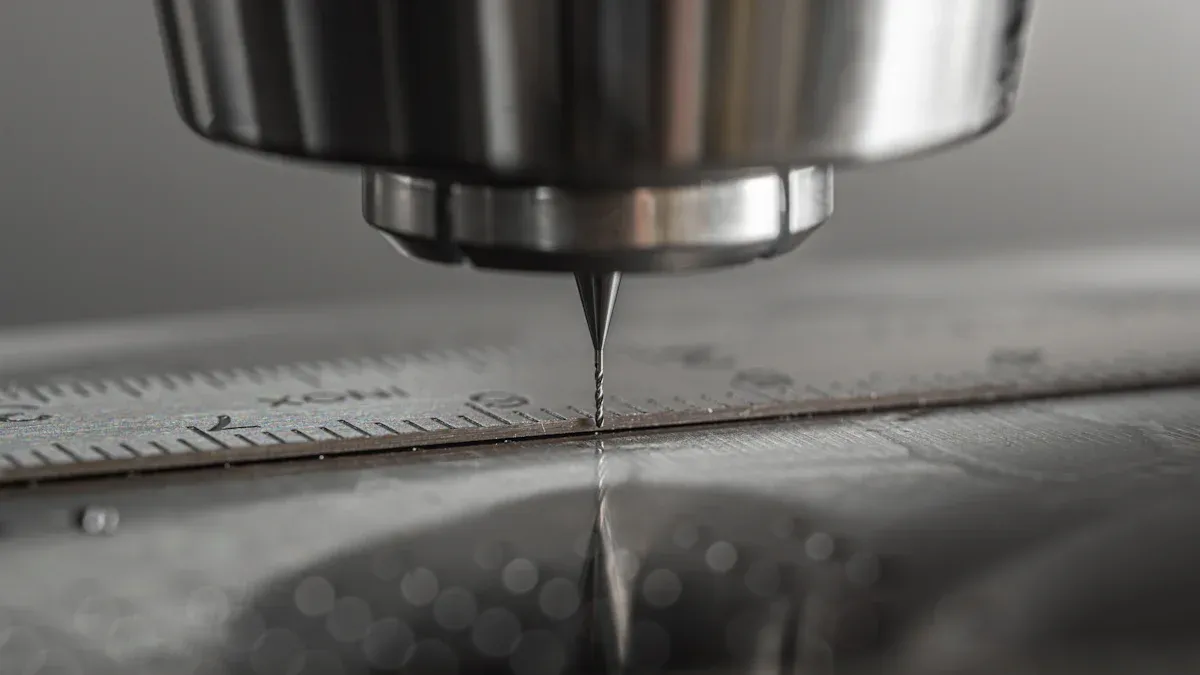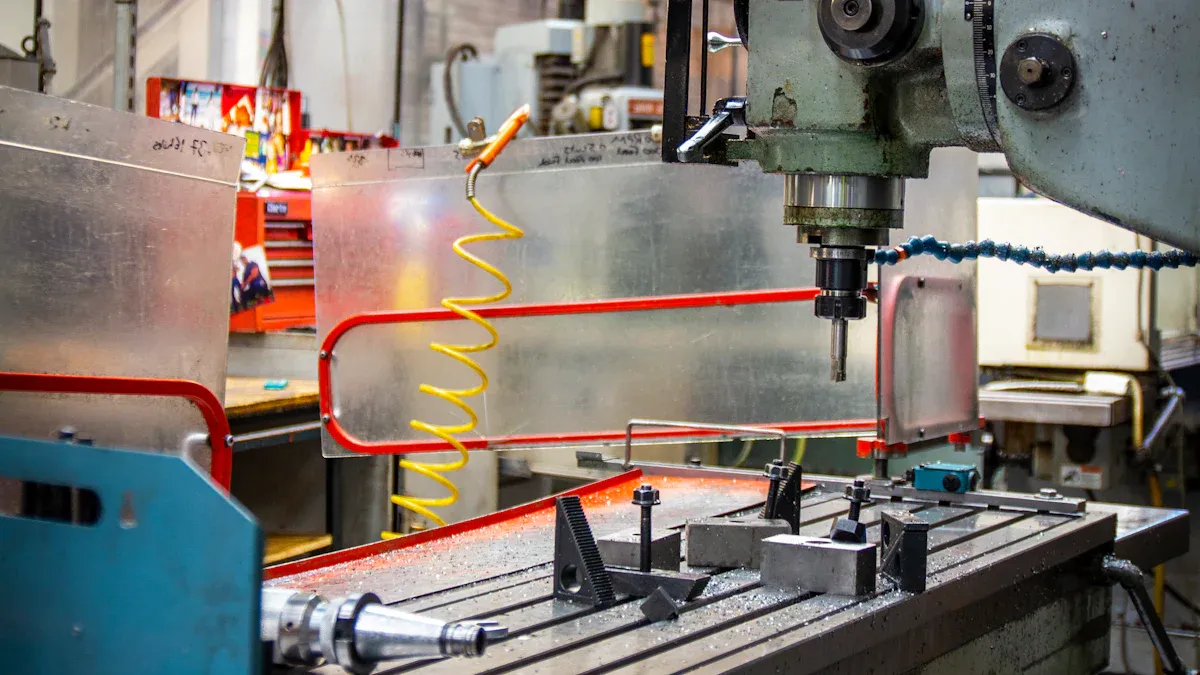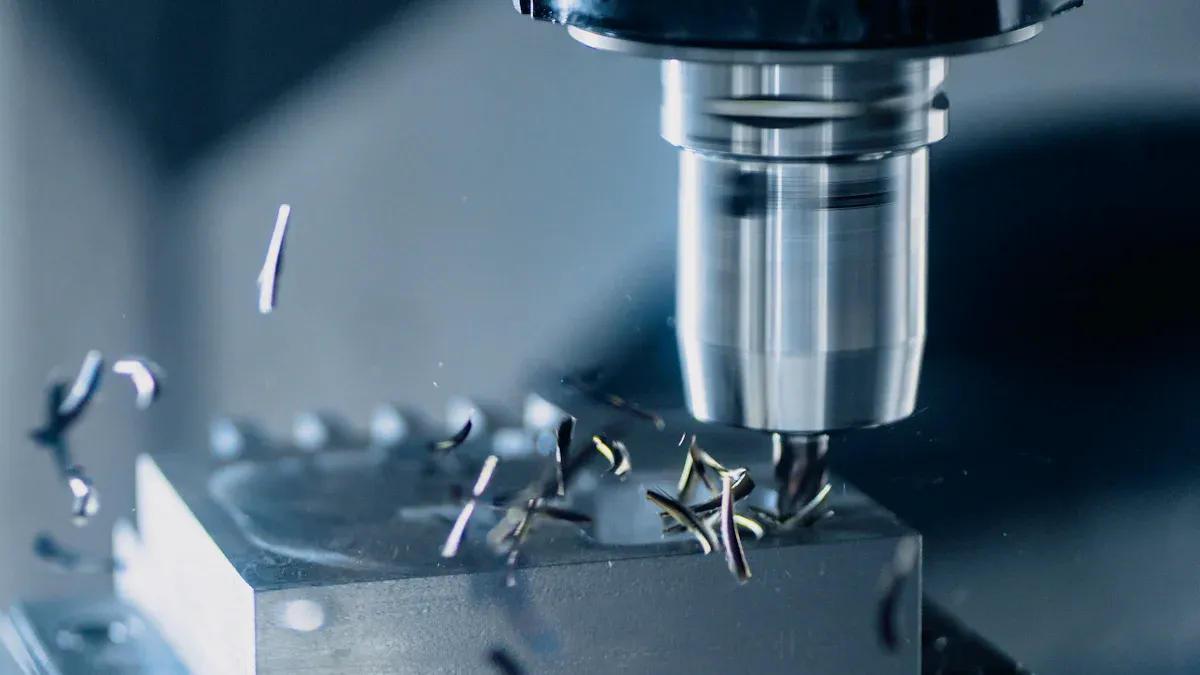How CNC Machining Can Custom Cut Aluminium for Complex Designs

CNC machining, particularly Aluminium CNC Machining, offers unmatched precision for crafting intricate aluminum designs. You benefit from aluminum’s unique properties, including exceptional machinability, lightweight strength, and high ductility. Industries like aerospace, automotive, and electronics rely on Aluminium CNC Machining for its efficiency. With the global CNC machining market projected to hit USD 129.9 billion by 2027, its importance continues to grow.
Key Takeaways
CNC machines do the work automatically. This makes parts very accurate and the same every time. It lowers mistakes and boosts work speed.
Aluminum is strong but light and easy to shape. These traits make it great for CNC machines in industries like planes and cars.
Picking the best aluminum type and smart designs helps a lot. It saves money, works faster, and makes better products.
Understanding Aluminum CNC Machining

What Is CNC Machining?
CNC machining is a manufacturing process that uses computer-controlled machines to create precise and intricate components. Unlike traditional machining, which relies on manual operation, CNC machining automates the entire process. This automation ensures exceptional accuracy and repeatability, reducing the chances of human error. You can also benefit from its ability to operate continuously, which increases productivity and shortens production times. CNC machining optimizes material usage, resulting in less waste and higher-quality parts.
Why Aluminum Is Ideal for CNC Machining
Aluminum stands out as an excellent material for CNC machining due to its unique properties. Its lightweight nature makes it easy to handle, while its strength ensures durability. Aluminum’s high machinability allows for faster cutting speeds without compromising precision. Additionally, its corrosion resistance and thermal conductivity make it suitable for various industries. CNC machines equipped with advanced cooling systems and precision controls further enhance the process of machining aluminum, ensuring accurate and efficient results.
Applications of Machining Aluminum in Complex Designs
You’ll find aluminum CNC machining used in a wide range of industries. In aerospace, it’s essential for creating lightweight yet strong components like aircraft fittings and frames. Automotive manufacturers rely on it for engine parts and chassis. Electronics companies use it for device housings, such as laptops and smartphones. Aluminum is also popular in medical devices, defense systems, and marine applications. Its versatility and machinability make it ideal for producing intricate designs across these fields.
The Process of Aluminum CNC Machining
Tools and Techniques for Precision Cutting
To achieve precision in aluminum machining, you need the right tools and techniques. CNC milling machines are essential for creating complex components with smooth finishes. CNC turning is ideal for producing cylindrical parts with precise dimensions. For drilling holes in aluminum, CNC drilling offers unmatched accuracy. Advanced CNC technology also includes water jet cutting, which uses high-pressure water to preserve material properties, and laser cutting, which ensures high-speed production with clean edges. Electrical discharge machining (EDM) is another option, perfect for intricate designs requiring exceptional detail. Each technique plays a vital role in delivering machined aluminum parts with superior quality.
Steps in the CNC Machining Workflow
The aluminum machining process follows a structured workflow to ensure precision. First, you start with design and programming by creating a CAD model and generating the CNC program (G-code). Next, you select the appropriate aluminum alloy based on your project’s requirements. Afterward, you set up and calibrate the cutting tools to prepare for machining. The machining operations then remove material from the aluminum workpiece using tasks like milling, turning, or drilling. Finally, post-machining steps, including surface finishing and inspections, ensure the parts meet your design specifications.
Ensuring Accuracy in Complex Designs
Maintaining accuracy in aluminum machining processes requires strict quality control measures. Dimensional tolerances ensure the parts fit together seamlessly. Automated inspection systems, powered by AI, enhance precision by identifying defects quickly. Traceability helps maintain consistency by linking production lots to their material sources. Mechanical property tests, such as tensile and hardness tests, confirm that the machined aluminum parts meet industry standards. These measures guarantee that even the most complex components are produced with exceptional precision.
Benefits of CNC Machining for Aluminum Designs

High Precision and Repeatability
CNC machining ensures exceptional precision when creating high-quality aluminum parts. Automated processes reduce human error, delivering consistent and reliable results. This makes it possible to produce intricate and complex designs with remarkable accuracy. For example, CNC milling uses rotating cutting tools controlled by computer software to achieve smooth finishes and precise shapes. These capabilities are essential for industries requiring tight tolerances and flawless components.
Tip: CNC technology guarantees repeatability, ensuring identical parts in every production cycle.
This is achieved through:
Pre-programmed software that controls machinery movements.
Automation, which minimizes errors and enhances reliability.
Computer instructions that maintain precision across multiple runs.
Flexibility for Customization
CNC machining offers unparalleled design flexibility for custom aluminum extrusions and other projects. You can choose from various customization options to meet your specific needs:
Coating: Add protective layers like powder coating or liquid paint.
Anodizing: Improve corrosion resistance and aesthetics.
Hard Anodizing: Provides superior protection with a thicker oxide layer.
Decorative Anodizing: Combines durability with attractive finishes.
These options allow you to tailor your aluminum parts for both functionality and appearance, making CNC machining a versatile solution for diverse applications.
Cost-Effectiveness for Intricate Projects
CNC machining balances cost-effectiveness with the ability to create intricate designs. Aluminum’s machinability reduces production time and costs, making it an economical choice for complex projects. By selecting the right aluminum alloy, such as 6061-T6, you can further optimize expenses without compromising quality. High-efficiency machining techniques and optimized tool paths also play a crucial role in minimizing machining time and extending tool life. This approach ensures you achieve intricate designs while staying within budget.
Benefit | Description |
|---|---|
Increased Efficiency | Continuous operation enhances production rates and workflow efficiency. |
Cost Savings | Automation reduces waste and labor costs, optimizing resources. |
Exceptional Precision | High accuracy minimizes errors, enabling intricate designs. |
Versatility | Supports a wide range of applications, from electronics to construction components. |
High Quality Outputs | Consistent results meet or exceed industry standards. |
CNC technology not only delivers high-quality aluminum parts but also ensures cost savings and efficiency, making it a preferred choice for manufacturers.
Key Considerations for Machining Aluminum
Material Selection and Design Optimization
Choosing the right aluminum alloy is critical for achieving the desired quality in your CNC machining projects. Different alloys, such as 6061 and 7075, offer varying machinability and high strength-to-weight ratio. For outdoor applications, prioritize corrosion-resistant options like Aluminum 5052 or 6063. Indoor projects can use versatile alloys like 2024 or 6061, though additional coatings may be necessary for durability.
Optimizing your design improves machining efficiency and reduces costs. Focus on selecting appropriate tool geometry to ensure clean cuts and minimize waste. Adjust cutting speeds and feed rates to maintain surface finish and extend tool life. Efficient chip evacuation systems prevent clogging and enhance productivity. By refining your design, you can achieve high-quality parts while conserving resources.
Tip: Incorporate features that enhance machinability, such as uniform wall thickness and simplified geometries, to avoid manufacturing issues.
Balancing Cost, Time, and Quality
Balancing cost, time, and quality requires careful planning. Complex designs often increase machining time and expenses due to advanced tooling and longer processing durations. Simplifying your design can reduce costs by minimizing material waste and processing requirements.
Investing in high-quality tools may seem costly upfront but can save money in the long run by reducing tool wear and replacement frequency. Additionally, CNC machining’s automation capabilities allow for continuous operation, improving efficiency and lowering labor costs. Post-processing services, like anodizing or powder coating, enhance part quality but should be factored into your budget.
Choosing the Right CNC Machining Partner
Selecting the right CNC machining partner ensures your project meets quality standards. Look for providers with experience in your industry and advanced equipment capable of delivering precise parts with tight tolerances. Evaluate their ability to handle both prototyping and large-scale production.
Criteria | Description |
|---|---|
Ensure the provider guarantees precision and surface finish quality. | |
Lead Time and Flexibility | Check their ability to meet deadlines and offer expedited services. |
Cost and Quotes | Request detailed quotes, including material wastage and additional services. |
Post-Processing Services | Confirm availability of options like anodizing or bead blasting for enhanced functionality. |
Client References and Reviews | Review feedback from previous clients to assess reliability and satisfaction. |
Partnering with a specialized CNC machining provider gives you access to faster iterations, improved precision, and various post-processing options, ensuring your aluminum parts meet the highest quality standards.
CNC machining offers unmatched precision and efficiency for creating intricate aluminum designs. Its advanced technology ensures high-quality results while enabling flexibility for customization.
Long-term benefits include:
Enhanced productivity and reduced defects.
Cost savings through optimized tools and processes.
By understanding the process, you can leverage CNC machining to stay competitive and innovate in aluminum manufacturing.
FAQ
What types of aluminum alloys work best for CNC machining?
You should consider 6061, 7075, and 5052 alloys. These offer excellent machinability, strength, and corrosion resistance, making them ideal for various applications.
How do you ensure precision in CNC-machined aluminum parts?
Precision comes from using advanced tools, automated processes, and strict quality checks. Techniques like dimensional tolerance testing and AI-powered inspections guarantee accuracy.
Can CNC machining handle small production runs?
Yes, CNC machining is perfect for small runs. Its automation minimizes setup time, making it cost-effective for prototypes or limited production quantities.
Tip: Always discuss your project requirements with your CNC machining partner to optimize results for small or large-scale production.
See Also
Uncovering The Benefits Of Aluminum CNC Machining Solutions
Streamlined CNC Machining Services For High-Precision Production
A Comprehensive Look At CNC Machining Alloy 7075 Uses
Investigating CNC Machining Services For Accurate Manufacturing
About US
Follow Us
Your prototype holds unparalleled significance, and we deeply value its uniqueness. Collaborating with you during the preparation phase for running your prototype or parts is a commitment we gladly embrace. Whether it's a single part or a complex assembly, we are dedicated to selecting the optimal tools and pathways to bring your envisioned product to life.
At Precision Fab CNC Machining, we specialize in producing parts for prototypes, short runs, and high-volume production. Our prototyping machine capabilities extend across metal, plastic, and wood machining, with welding fabrication services available to complement and finalize your prototype if required.
Address
Address: Room320 10F, Building A,Nanshan international building, Dayawan District, Huizhou, Guangdong, 516001 China
Contacts
billy@timaycnc.com

